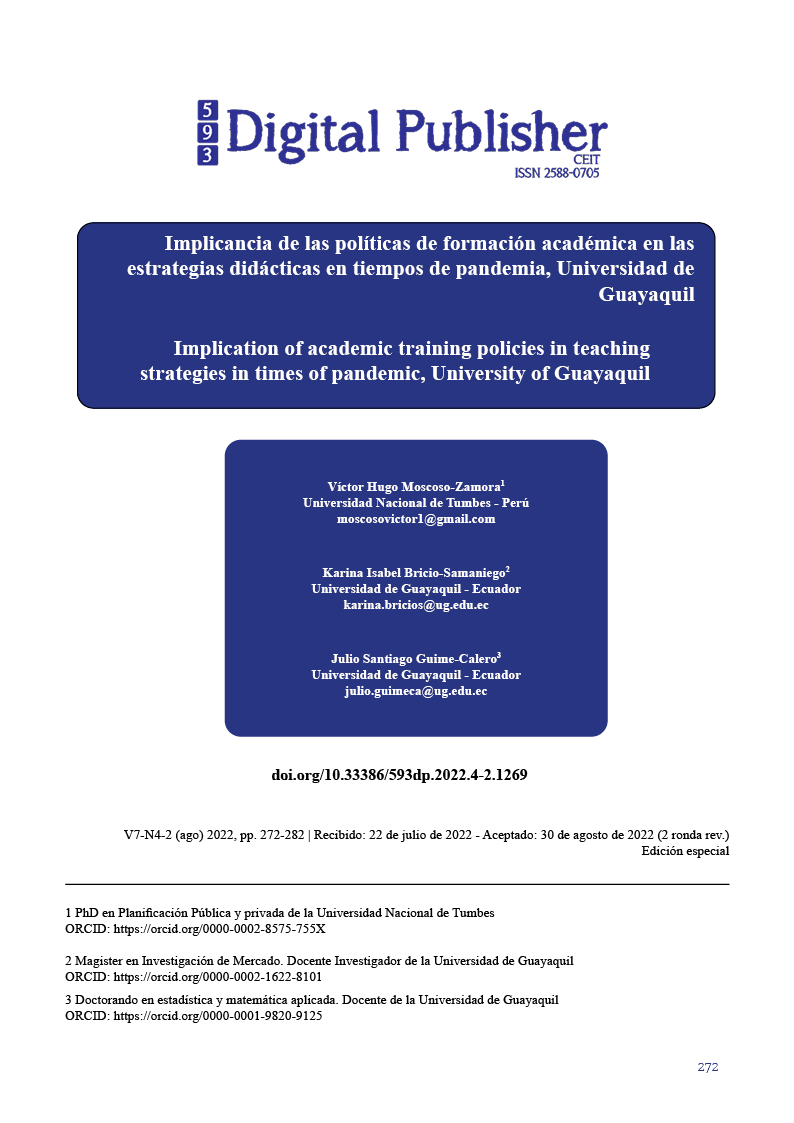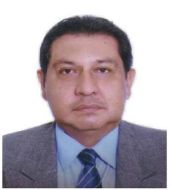Implication of academic training policies in teaching strategies in times of pandemic, University of Guayaquil
Main Article Content
Abstract
The present study was carried out with the objective of assessing the implication of the Methodological-Academic Guide, Resolution No. R-CIFI-UG-SE24-124-29-05-2021, of the University of Guayaquil in the implementation of appropriate didactic strategies to the classroom context in times of pandemic, its impact on the teaching-learning process, and the level of educational quality in the pursuit of academic excellence. The methodological research design had a quantitative and interpretive approach, with a descriptive and explanatory scope, in addition, the methods were used; dialectical, analogical and inferential. The research was carried out in one of the most representative careers of the institution. Information was collected through the survey technique, using the Google forms tool, and for the tabulation and contrast of the results, Excel, and the SPSS Statistics software. The statistical results determined the levels of impact of the regulations on the didactic strategies used, as well as a direct and significant bilateral correlation, in the interaction between teachers and students.
Downloads
Article Details

This work is licensed under a Creative Commons Attribution-NonCommercial-ShareAlike 4.0 International License.
1. Derechos de autor
Las obras que se publican en 593 Digital Publisher CEIT están sujetas a los siguientes términos:
1.1. 593 Digital Publisher CEIT, conserva los derechos patrimoniales (copyright) de las obras publicadas, favorece y permite la reutilización de las mismas bajo la licencia Licencia Creative Commons 4.0 de Reconocimiento-NoComercial-CompartirIgual 4.0, por lo cual se pueden copiar, usar, difundir, transmitir y exponer públicamente, siempre que:
1.1.a. Se cite la autoría y fuente original de su publicación (revista, editorial, URL).
1.1.b. No se usen para fines comerciales u onerosos.
1.1.c. Se mencione la existencia y especificaciones de esta licencia de uso.
References
Alcahuamán, J. (2019). Gestión educativa y calidad de formación académica en temas de invetsigación en la Facultad de Contabilidad de la Universidad Católica de los Ángeles de Chimbote- Ayacucho-2019. Perú.
Angulo, A. (2018). Importancia del uso de las TICs en la formación continua de los docentes. (L. y. Universidad de Guayaquil Facultad de Filosofia, Ed.) Recuperado el 7 de Enero de 2020, de http://repositorio.ug.edu.ec/handle/redug/28999
Aranguren, J. (2018). ¿Que es lo académico? según Josef Pieper. Unir revistas, 2.
Arias, F. (2012). El proyecto de investigación. Caracas.
Bonifaz, E., & Barba, E. (2019). La calidad de Educaación Universitaria: una visión desde el direccionamiento y gestion estrategica. REDIPE, 8(3), 106 - 116.
Brunner, J. (2000). Globalización y el futuro de la eduación: Tendencias, desafíos y estrategias.
Carriazo Diaz, C., Perez, M., & Gaviria, K. (2020). Planificación educativa como herramienta fundamental para una educación con calidad. REVISTA INTERNACIONAL DE FILOSOFÍA Y TEORÍA SOCIAL, 87 -95.
Casasola, W. (2020). El papel de la didáctica en los procesos de enseñanza y aprendizaje universitarios. Revista Comunicación, 29, 14.
Castells Olivan, M. (1998). Los efectos de la globalización en la Universidad.
Cruz, Yazmin. (2009). La acreditación como mecanismo para garantizar la calidad. España.
Dirección General tecnológica de Información, d. l. (2021). Información de Docentes, Estudiantes y titulados. Guayaquil.
Fortea, M. (2019). Metodologías didácticas para la enseñanza/aprendizaje de competencias. Materiales para la docencia universitaria de la Universitat Jaume I.
Hernández, R., Carlos, F., & Carmen, B. (2014). Metodología de la Investigación. Mexico.
Lamarra, N. (2010). Universidad Pública.
López Montero, R. (1 de Julio de 2018). Propuesta de internacionalización desde las estratégias didácticas universitariass. ALTERIDAD revista de educación, 239 - 250.
Méndez Chang, A. E. (Octubre de 2020). Política de formación académica con enfoque RSU para la Universidad de Panamá, planificación acción. Revista Acción y reflexión educativa, 45, 28 -59.
Ramírez, J. (2018). La planeación estratégica y la calidad docente en la Universidad. Torreón Universitario, 12.
Roberto Hernandez, e. a. (2018). Metodología de la Investigación, rutas, cuantitativa, cualitativa y mixta. Mexico: Mac Graw Hill.
Semper, M. (2020). La planificación estratégica de los procesos de acreditación de las carreras de grado de la Universidad Nacional de la Plata como política permanente de mejoramiento. Mar del Plata, Argentina: Instituto de Investigaciones en Educación Superior.
Superior, C. d. (2020). Reglamento de régimen académico. Reglamento de régimen académico 2020. Quito, Ecuador.
Tamayo, M. t. (2012). El proceso de la Investigación Científica. Mexico, mexico: Limusa.
Tovar, J. C., & Cárdenas, N. (2012). La importancia de la formación estratégica en la formación por competencias: evaluación de las estrategias de acción para la solución de problemas. REDIE. Revista Electrónica de Investigación Educativa, 14(1), 122-135. Obtenido de https://www.redalyc.org/articulo.oa?id=15523175008
UNESCO. (1995). Conferencia sobre Declaración Educación Superior.





